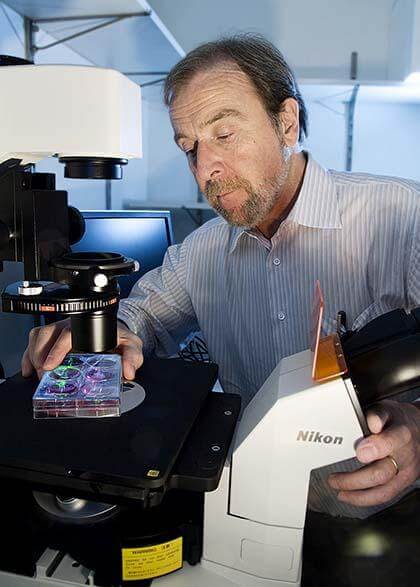By Howard Koplowitz
Researchers at the North Shore-LIJ-run Feinstein Institute have discovered that a protein linked to leukemia is also important to understanding Alzheimer’s disease, which may soon lead to an Alzheimer’s drug based on one used to treat the blood cancer.
“A number of things have suggested to us that Alzheimer’s disease is a little bit like cancer,” said Dr. Peter Davies, director of the Litwin-Zucker Center at the Feinstein Institute, which has its offices on the campus of North Shore University Hospital.
Davies said the research, published in the June 14 issue of the Journal of Alzheimer’s Disease, discovered that the brain cells of Alzheimer’s patients are trying to divide, but there is no space for them to multiply in the brain.
“It looks like they’re tying to,” Davies said.
In both Alzheimer’s and leukemia, Davies said, a well-known protein called c-Abl is “turned on” in patients with both conditions.
“C-Abl gets turned on and that drives white blood cells to division,” he said.
The research found that c-Abl might be important in the plaques and tangles that cause brain cells to die in Alzheimer’s patients.
“But why they die, we really don’t know,” Davies said.
He said a leukemia drug that fights the activation of c-Abl may also help Alzheimer’s patients, but a different version of the medication would have to be developed for people with the degenerative brain disease.
“If you treat chronic myologous leukemia with drugs that block c-Abl, you basically put the disease in complete remission,” Davies said.
A different drug would need to be developed because the medication used for leukemia patients does not penetrate the brain, he said.
“It won’t take long to develop tests within a couple years,” he said of the potential new Alzheimer’s drug. “This is a way to potentially prevent this disease or stop in its early stages.”
The potential drug, however, may not be able to cure those with late stages of Alzheimer’s, Davies said.
“Treating advanced Alzheimer’s is always going to be difficult because we’re not going to be replacing dead cells, at least not in my lifetime,” he said.
Davies said Alzheimer’s is “probably over-diagnosed these days,” with symptoms such as memory loss being attributed to the disease when it may just be a sign of aging.
The link between c-Abl and Alzheimer’s disease took decades to discover.
“This is a novel finding that took a while to get here,” Davies said. “It’s really a neat piece of science. It’s a really novel approach to Alzheimer’s disease. I’m very excited about the prospect of a new approach to treating Alzheimer’s disease.”
Reach reporter Howard Koplowitz by e-mail at hkoplowitz@cnglocal.com or by phone at 718-260-4573.






























